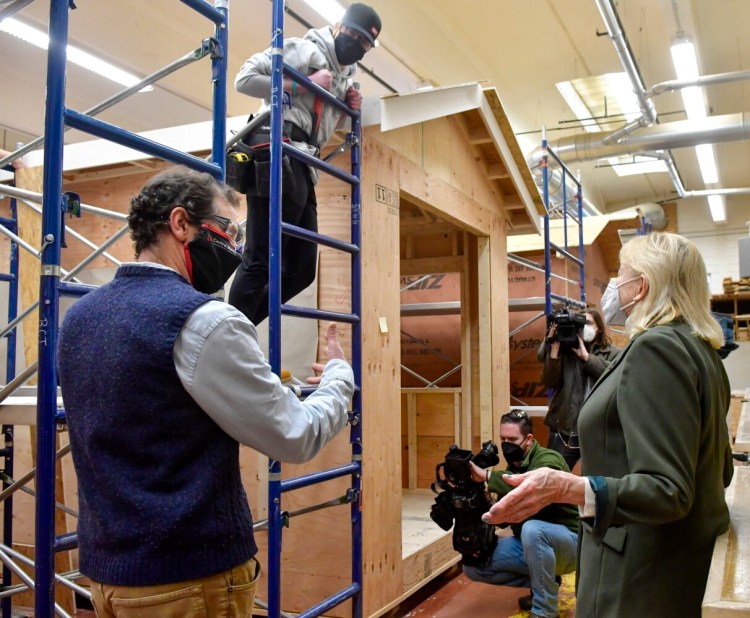AUBURN – More than a dozen students at Central Maine Community College offered the same adjective to describe a new proposal from Gov. Janet Mills to make community college free for many students: “Great.”

Gov. Janet Mills talks Friday about a tuition-free community college plan during a visit to the building construction technology section of Central Maine Community College in Auburn. Joe Phelan/Kennebec Journal
Myah Nicholas of Lewiston even called it both “a great idea” and “a great opportunity” for students who might otherwise go straight from high school to a job.
Whatever legislators may think about the governor’s $20 million proposal, community college leaders and students expressed strong support for it Friday during an appearance at the Auburn campus to promote her initiative.
“It will have a really positive impact not only on this campus but systemwide,” said William Cassidy, who chairs the board of the Maine Community College System.
He said it “meant a good deal” that the governor chose to push the plan on the first day after she announced it during Thursday’s State of the State speech.
Mills’ plan would provide up to two years of free community college for students who graduated in 2020 or later, at least through the class of 2023. That’s worth as much as $3,800 annually for students at today’s tuition rate.
Under the plan, eligible, full-time students would first apply for grants and scholarships. The state would take off whatever their remaining bill is.
Not everybody’s on board with the idea, which requires legislative approval.
The executive director of the Maine Republican Party, Jason Savage, said Friday that “given that Janet Mills’ school lockdowns deeply hurt students and parents’ mental, emotional and financial health, any of her election-year proposals funded by federal funny money should be met with extreme skepticism.”
Sarah Poli, a student from Benton, said the governor’s proposal would help out many “students who are struggling” and who need the extra money to make it possible to earn their degrees or certification.
Though she and others said community colleges are already affordable for many, “even if it’s super cheap, it will be a burden” for some, said Demarco McKissic, a student from Laconia, New Hampshire.
Mills said she deliberately focused on young students whose education was disrupted by the pandemic.
“We need these people in our workforce,” she said, “and we need them as soon as possible.”
Maine Community College President David Daigler said the pandemic has driven many low-income students out of the system as they’ve struggled financially and with other hardships related to COVID-19. Offering to make it free for them to return, he said, will likely spur some to come back.
He said he anticipates about 8,000 young people will take up the offer if the Legislature gives its backing to the plan.
Mills said she hopes it will succeed and become a permanent program in Maine.
In the fall, Maine’s community colleges enrolled more than 15,000 students statewide, but only a third of them attend full-time.
Daigler said it is a “bold step” to invest in students who “had their education stymied” by the pandemic but one that will pay off by sending debt-free graduates into a variety of careers that require the skills they can acquire at community college.
Christine Kendall, CEO of Auburn-based H.E. Callahan Construction Co., said her industry is desperate for new carpenters, plumbers and electricians, some of the trades that community colleges churn out.
“We need young minds,” she said, that can spur innovation in everything from offshore wind to high-tech medical facilities.

Gov. Janet Mills wears embroidered L.L.Bean boots Friday during a visit to Central Maine Community College in Auburn. Joe Phelan/Kennebec Journal
Having more financial assistance would provide greater incentive for Maine’s young people to stay in the state, said Calder Horowitz, a student from Burlington, Vermont, who said he came to CMCC “to play basketball and go to an awesome school.”
Mills and Daigler said students who come to Maine’s community colleges from other states may also quality if they indicate they will stay in the Pine Tree State.
Mills told a group of high school students touring the Auburn campus they should consider attending.
“This is a great location,” the governor said, “near most everything you’d like to get to,” including some good fishing spots.
“All you’ve got to do is give it your all,” Mills told the students.
Spotting some other students collecting canned goods for a food pantry, Mills thanked them for their efforts, then apologized she had nothing to contribute.
“I should have brought you stuff from the Blaine House,” Mills said.
The $20 million community college spending plan is expected to be a key provision in the supplemental budget proposal that Mills said she will likely provide to the Legislature next week.
The plan will also suggest keeping tuition hikes in check for students in the University of Maine system and a revision in the Opportunity Maine Tax Credit to make it easier for Mainers with student debt to get some relief.

Gov. Janet Mills, left, talks Friday with second-year building construction technology student Emma Thorburn about making stair treads during Mills’ visit to Central Maine Community College in Auburn. Joe Phelan/Kennebec Journal
Send questions/comments to the editors.



